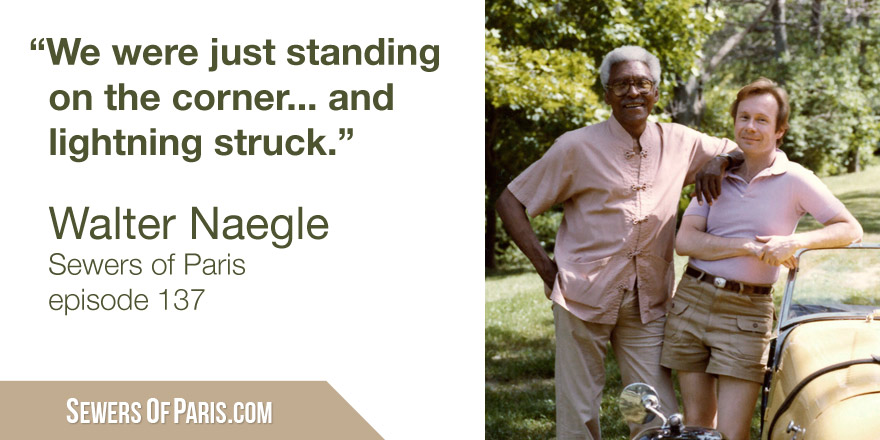Huge thanks to everyone supporting the show on Patreon! Help keep the show going with a pledge at http://patreon.com/SewersOfParis.
This Week's Guests: Walter Naegle & Matt Wolf
How do radical movements for justice become mainstream over time? This week I'm talking to two guests: the first is Walter Naegle, the surviving partner of Bayard Rustin; and the second is Matt Wolf, who made a documentary short about Walter entitled Bayard and Me. Bayard was a key figure in the civil rights fight starting in the 60s -- he was a mentor to Martin Luther King Jr, worked on behalf of refugees, and became an LGBT spokesperson in the 80s. Because there was no relationship recognition at the time, adopted his partner, Walter, in 1982 -- and that's just one of the subjects explored in Matt Wolf's documentary.
Big thanks to everyone supporting the Sewers of Paris on Patreon. I could not make the show without you. If you're enjoying the show, please help keep it independent and ad-free with your pledge of support. Just go to SewersOfParis.com and click support the show on Patreon.
And if you've got a minute, a review would be super helpful as well. Head over to SewersOfParis.com -- there's a link right at the top of the page for writing a review on Apple Podcasts. Thanks to Nordbon who left a review in Swedish -- they used the word "kulturparlor" -- that's culture pearls -- to refer to the books and movies and songs that guests talked about, and I love that term. Tack så mycket Nordbon!
I love to hear from listeners -- the show's @SewersOfParis on Twitter and Facebook. Or you can write to sewerspodcast@gmail.com.
Also, mark your calendars for the weekend of November 4th -- I'm going to be doing a 24-hour videogame livestream to benefit Seattle Children's Hospital. We're raising funds to help care for kids and conduct groundbreaking research -- go to bit.ly/extralifeseattle for details and to donate.
This Week's Recommendation: Bayard & Me
Big thanks to Walter and Matt for joining me. This week's recommendation is to check out their short documentary, Bayard and Me. It's about 15 minutes long, and it's both tender and energizing. The tender scenes give a glimpse into the loving relationship of two men who cared deeply for each other. And the energizing scenes seize you with the passion they both shared for social justice.
One of the reasons Bayard adopted Walter was so that Walter could keep their home when Bayard passed away. There's a remarkable moment in the documentary when we see a photograph of Bayard standing on a balcony with some small plants, decades ago... and then it cuts abruptly to Walter watering large plants on the same balcony today. Bayard & Me pulls off a remarkable feat -- bridging activist causes across not just decades, but generations.
It's so easy to forget the struggles that came before, or to assume that a struggle started when you became aware of it. Bayard & Me draws a line from Bayard's early work in India, with the followers of Ghandi, in the 1940s ... to the bus boycotts and marches on Washington in the United States ... to the approach he shared with Walter in protecting queer rights ... and now to the activism advanced in Matt's documentary, and to the audiences watching the doc around the world.
When Martin Luther King talked about the moral arc of the universe bending towards justice, I'd like to think that this is the sort of thing he meant. Ghandi's first major victory was 100 years ago, in 1917, and here we are a century later continuing to fight for what's right -- occupying just one branch of a family tree that grows continuously towards justice.












